It’s an undeniable fact that sleep is crucial for your overall health and wellbeing. In fact, it is during sleep that our body carries out all of the major housekeeping and repairs within all the systems of the body.
As we sleep, our muscles are repaired, waste products are removed from our cells and immune responses are busy to ensure that when we wake, our body is ready to fit and ready for another day.
A growing body of research has shown that getting enough good sleep is essential for your immune system. This is the body’s defence network that prevents or limits infection in your body.
Healthy sleep can help boost the immune system and can even help to prevent you from getting sick as often.
Sleep not only increases your immune system function. It’s also been shown to play a role in improving antibody responses to vaccinations.
This means getting enough sleep before and after you’re vaccinated can help vaccines work in your body.
In this article, we delve deeper into the topic to provide you with an understanding of the role that sleep can play in immune function.
Sleep and the immune system
How many times have you felt poorly before bed only to hear the reassuring words ‘you’ll feel so much better after a good night’s sleep?’
It’s not always the case, of course, but there’s plenty of truth in — and science behind — a saying passed down through the generations. Better sleep means better health.
Unsurprisingly, the COVID-19 pandemic reignited the debate around the importance of sleep as a means of bolstering immune function.
Are better sleepers better protected against illness? Can a lack of quality sleep damage your immune system? The answer to both questions is a resounding ‘yes’.
Sleep as a superpower
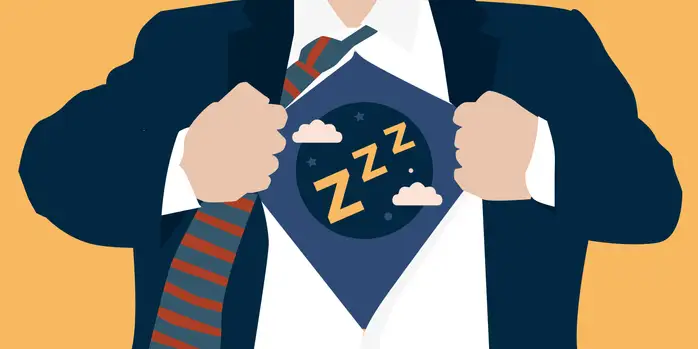
Although some people say that sleep is a superpower, it’s just a normal everyday process that keeps the brain and body, including the immune system, working at its best.
It’s probably because we all do it every night that we forget just how key sleep is to our health and wellbeing. Sleep is a fantastically effective physiological process that provides the foundation for good health.
Good sleep plays a vital role in the immune response’s ability to function, whereas a lack of sleep can reduce immunity from and increase susceptibility to infection.
In fact, numerous studies have demonstrated that sleep deprivation negatively impacts upon the immune system.1
So sleep is essential for keeping the immune system at its best. It’s also the case that sleep patterns can be altered by a poorly functioning immune response.
Your sleep and your immune system are interlinked. It’s a special relationship built to last.
Immunity from attack
Your immune system can be likened to an army protecting your body. It’s an incredibly sophisticated and complex system that works firstly to keep bacteria, viruses, parasites and many other pathogens at bay.
Should one of these baddies try to breach your defences, your immune system steps in to try to vanquish invading germs inside the body.
You have two levels of immunity: the innate and the acquired immune systems.
Innate immunity
Think of the innate system as the first line of defence. The baddies are approaching, they haven’t been fully identified yet, so your body uses non-specific defences to try and repel the invaders.
It looks for anything that doesn’t belong in your body and seeks to destroy it. Once a foreign organism has been detected, your immune system sends out signals which act to sound the alarm that a pathogen is present. The invader is marked with a ‘tag’ to identify it as a threat.
There are various ways in which the invader is then attacked and destroyed but, ultimately, the invading particle is broken down, any resulting waste material is removed and your innate immune system keeps waging its battle against invading foes.
Adaptive immunity
Your adaptive (or acquired) immune system is more specialised. This is the part that can fully recognise an invading pathogen and then accurately and specifically target an invader for destruction.
Each time your body encounters a new pathogen, your adaptive immune system takes a note of it. Records are kept about the best way to best deal with this latest invader should it ever come back.
This is known as ‘immunological memory’ and is the reason why you don’t get viruses like measles twice.
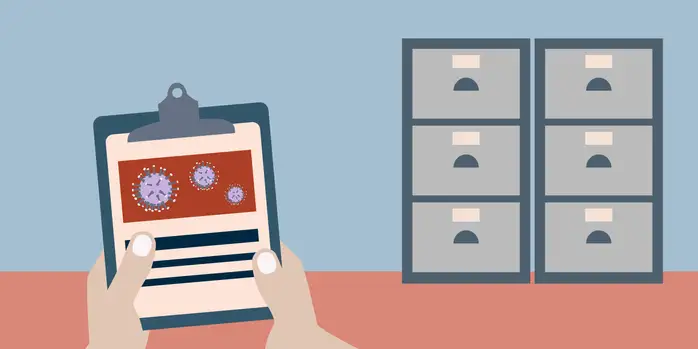
Sleep can affect how our immune cells function
Much like an army, the cells protecting your body can be split into different branches and all have their own specialisms. While we’re not going to go in-depth on every single type of cell, protein and molecule here, we’ve provided some details on the major players and those most discussed in sleep research.
T cells
T cells are a type of white blood cell and fall into two categories: helper T cells and cytotoxic T cells. Helper T cells raise an alarm that an intruder is in the body.
They do this by releasing molecular signals that let other immune cells know that an attack is under way and that help is needed.
Cytotoxic T cells have a much more direct role in fighting infection. They recognise cells that have been invaded by pathogens and they attach directly to those cells, using various methods to destroy them.
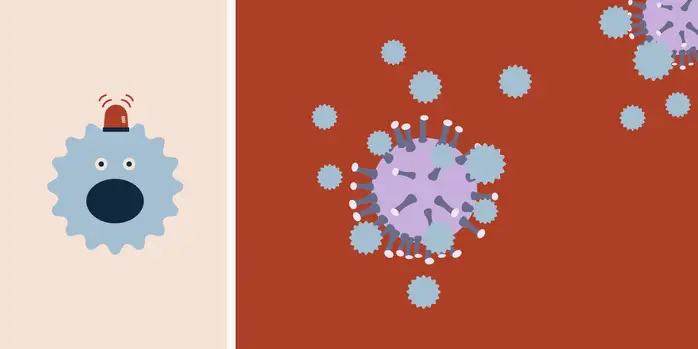
Sleep fact: When scientists compared T cells from volunteers who were allowed to sleep for 8 hrs a night with those who stayed awake all night, they found that the T cells in the sleep-deprived group had a much lower ability to bind to a key molecule featured in the immune response.
As we’ve mentioned above, binding to both infected cells and other immune system cells is a T cell’s primary objective. Without their ability to stick, they cannot fulfil their role in the immune response.2
This study therefore sheds light on how sleep deprivation can directly affect our immune response.
B cells
B cells are another type of white blood cell which patrol the body, searching for pathogens.
B cells have antibodies on their surface that can bind to pathogens as well as other things. It helps to think of the antibody like a jigsaw piece. On the surface of the B cell is one jigsaw piece of a two-piece puzzle.
B cells float around the body and when they come into contact with a virus or bacteria that happens to have the other half of the jigsaw on its surface, then the B cell binds to it. This signals that an invader has been found and targeted for destruction.
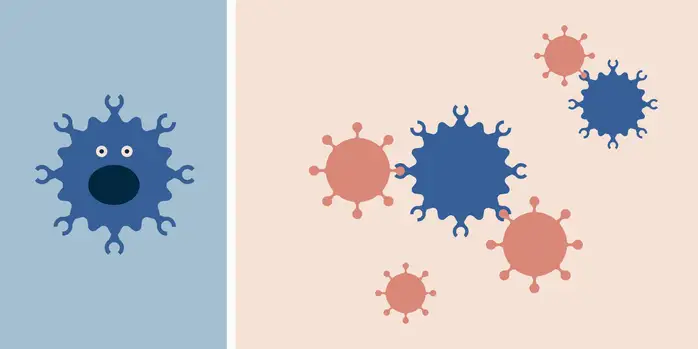
Helper T cells can bind to B cells to allow them to secrete multiple copies of their specific antibody. The free antibody which will then bind to any pathogen they are specific to and target them for destruction.
They can also become memory B cells — essentially remembering a specific pathogen so that they can react appropriately if they come across it again.
NK cells
We have natural killer (NK) cells that will destroy cells that have been invaded and taken over by pathogens. They do this by secreting compounds that tell the infected cell to shut itself down by a process known as programmed cell death.
Sleep fact: Restricting sleep to four hours for just one night was found to reduce NK cell activity by an average of 72% compared to levels after a full night’s sleep.3
NK cells play an essential role in killing tumour cells and research has shown that reduced NK cell function is associated with a 1.6 times greater risk of dying from cancer.4
Phagocytes
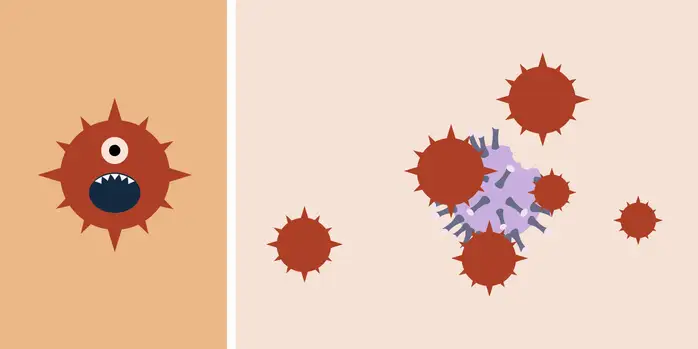
This is a group of white blood cells including neutrophils, macrophages and dendritic cells which all have the ability to engulf (or ‘eat’) pathogens they find.
Once the pathogens are inside these cells, phagocytes use various methods to break down the invading pathogens to get rid of them. Each type of phagocyte has its own locality and superpower:
- Neutrophils — found in huge quantities in the blood and usually the first cells to arrive at a site of infection.
- Macrophages — can cross out of blood vessels to fight infections in other parts of the body.
- Dendritic cells — found in tissues and key to linking the innate and acquired immune responses together, allowing for communication between the two.
All of the cells detailed above have multiple other roles in addition to those listed above and there is huge cross-talk and co-operation between them.
Your immune cells (and many others) also secrete small proteins known as cytokines, which have a huge role in the immune response.
Cytokines
Cytokines act like small messengers to bring immune cells to the scene of the invasion, to amplify the signals that an attack is underway and to allow the different cells of the immune response to essentially ‘communicate’ with each other.
They are crucial to your immune response and there are many different families and subgroups of cytokines which perform a whole host of different roles within your body.
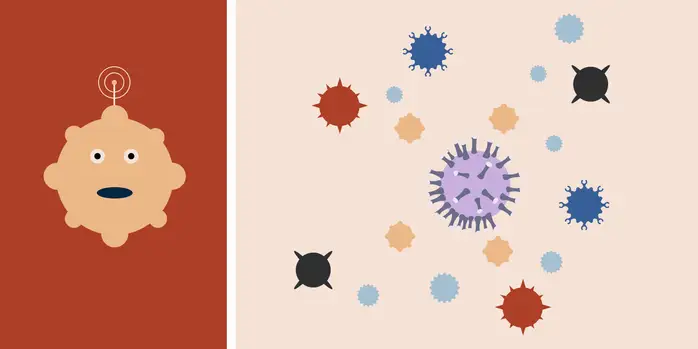
Sleep fact: Research has shown that restricting sleep led to the generation of inflammatory cytokines which are known to play a role in the development of heart, blood vessel and metabolic disorders.5
Poor sleep increases the risk of catching a cold
Several reports have shown that poor sleep increases the chances of becoming infected after being exposed to the cold virus.
A recent study from the University of California in San Francisco showed that people who slept fewer than six hours each night during the course of a week were more than 4.2 times more likely to catch a cold.
However, it should be noted that the researchers deliberately tried to infect the participants by directly administering nasal drops containing the cold virus.6

Sleep can help our body fight infections
Infection can often affect sleep patterns and you may find yourself experiencing periods of longer and deeper sleep when you fall ill. Why is that?
During the active phase of the immune response your body may seek to increase the duration of N3, slow-wave sleep (deep sleep) and decrease wakefulness and REM sleep. These changes to sleep may help your body to devote more resources to fighting an infection.
Are you worried about your sleep?
We can work with you to find the root cause of your sleep problems and help you to improve your sleep.
Infections can disrupt your sleep
Viral
It’s common for viral infections to disturb sleep, increase fatigue and cause fevers. In a study of people infected with a common cold virus, participants experienced decreased sleep time.
For these people, sleep efficiency fell by 5% during the virus’s active period compared with its incubation period.7
Bacterial
Bacterial infections also cause sleep disturbances. For example, human Lyme disease, caused by the bacterium Borrelia burgdorferi, is associated with chronic fatigue and sleep disorders.8
People experiencing Lyme disease complained of:
- difficulty falling asleep
- frequent nocturnal awakenings
- excessive daytime sleepiness.
They also experienced:
- increased time to fall asleep
- decreased sleep quality
- more short awakenings during the night
- broken sleep.
Sleep disorders can also develop during or after bacterial infections that target the respiratory system.
People with the bacterial infection listeriosis show increased total amounts of sleep, characterised by increased daytime sleep, less night-time sleep and longer durations of observed awakenings during the night.5
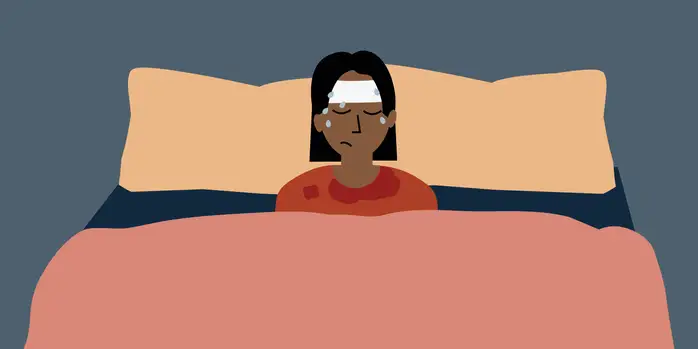
It’s been suggested that some sleep disorders, such as narcolepsy, may be related to bacterial infections.
This is based on the observation that many people with narcolepsy have antibodies to Streptococcus and Helicobacter pylori, which are associated with autoimmune diseases. These antibodies may be a trigger for narcolepsy through some autoimmune mechanisms.9
Parasitic
Parasitic infections, such as malaria, filariasis, and trypanosomiasis, appear to change sleep patterns by impacting upon the immune response.
A study examining links between sleep duration and parasitic infection levels looked at 12 mammalian species and found that longer sleep duration was linked with lower parasitic infection levels.
This finding led the authors to suggest that sleep evolved, in part, to protect animals from parasitic infections.10

Our body clock regulates how our immune system functions
Our body clock controls when we sleep and wake and research suggests it also plays a critical role in optimising immune system function.11
Recent studies show links between activity and sleep patterns in opposition to the natural body clock (including night-shift work) and raised levels of inflammation in the body.
Delayed sleep patterns (sometimes caused by shift-work) can disrupt the normal body clock. When frequently people stay up late (for work or pleasure) and sleep through the day this disruption to the body clock leads to chronic inflammation in the body.
Our body clock regulates when the levels of certain molecules of the immune system rise and fall. In a normal healthy state, when we sleep at night, our bodies actually have higher levels of inflammation than during the day.
This is because, during our sleep, when our body is busy repairing muscles and carrying out housekeeping tasks to remove toxins and waste, levels of immune molecules naturally rise during the night in order to carry out their roles in these tasks.
Work and lifestyle choices can affect immunity
During the night, as repairs and maintenance are complete, the body clock signals for inflammation levels to decrease and the body gets ready to start another day.
What’s happening in someone who stays up very late or works a night-shift is that their body clock naturally wants to carry out these tasks during the night, when the person is awake.
So the body clock sends signals to increase inflammation while the person is working, socialising or bingeing Netflix — signals that work best when the person is asleep.
When the person goes to sleep at a time that doesn’t align with their natural body rhythm this further confuses the body clock, because sleep is the time for repair.
Inflammatory molecules that were already raised during the night stay high in the body while the person is sleeping.
The net result of frequently poor sleep or night-shift work is constantly raised levels of inflammation compared to people who sleep at times that align with their natural body clock.
You can read our article on shift work for advice about how to manage shifts to reduce the impact of shift work.
Immunity and immunisation
The effect of poor sleep can also be seen in the immune response to vaccination. A study showed that partially sleep-deprived, healthy adults, who were immunised against influenza, developed antibody concentrations half the level of their well-rested peers.12
Researchers have also found that people who slept fewer than six hours per night are, on average, far less likely to mount an antibody response to the hepatitis B vaccine.
They were nearly 12 times more likely to be unprotected by the vaccine than people who slept more than seven hours.13
Achieving better sleep
It’s clear that sleep and immunity have a very close and intertwined relationship. By prioritising sleep and taking steps to ensure that your sleep is as good as it can be, you’re indirectly looking after your health and immune system too.
If you’re currently experiencing sleep issues or just feel like you want to improve your sleep overall, then we can help. Sleepstation is highly effective at helping people to overcome their sleep problems and get back to sleeping well.
So why wait? Answer a few short questions, and you could be on your way to better sleep today.
Summary
- Sleep and the immune system have an interdependent relationship.
- Good sleep improves your immune system.
- Your immune system is the first line of defence against illness.
- Infections — and fighting them — affect your sleep.
- Getting good quality sleep is key to maintain your health.
- Sleep can supercharge your immunisation.
References
- Besedovsky L, Lange T, Born J. Sleep and immune function. Pflugers Arch. 2012;463(1):121–37. ↩︎
- Dimitrov S, Lange T, Gouttefangeas C, Jensen ATR, Szczepanski M, Lehnnolz J, et al. Gαs-coupled receptor signaling and sleep regulate integrin activation of human antigen-specific T cells. J Exp Med. 2019;216(3):517–26. ↩︎
- Irwin M, Mascovich A, Gillin JC, Willoughby R, Pike J, Smith TL. Partial sleep deprivation reduced natural killer cell activity in humans. Psychosomatic medicine. 1994;56(6), pp.493-498. ↩︎
- Imai K, Matsuyama S, Miyake S, Suga K, Nakachi K. Natural cytotoxic activity of peripheral-blood lymphocytes and cancer incidence: an 11-year follow-up study of a general population. Lancet. 2000;356(9244):1795–9. ↩︎
- Ibarra-Coronado EG, Pantaleón-Martínez AM, Velazquéz-Moctezuma J, Prospéro-García O, Méndez-Díaz M, Pérez-Tapia M, et al. The bidirectional relationship between sleep and immunity against infections. J Immunol Res. 2015;2015:678164. ↩︎
- Prather AA, Janicki-Deverts D, Hall MH, Cohen S. Behaviorally assessed sleep and susceptibility to the common cold. Sleep. 2015;38(9):1353–9. ↩︎
- Drake CL, Roehrs TA, Royer H, Koshorek G, Turner RB, Roth T. Effects of an experimentally induced rhinovirus cold on sleep, performance, and daytime alertness. Physiol Behav. 2000;71(1–2):75–81. ↩︎
- Greenberg HE, Ney G, Scharf SM, Ravdin L, Hilton E. Sleep quality in Lyme disease. Sleep. 1995;18(10):912–6. ↩︎
- Aran A, Lin L, Nevsimalova S, Plazzi G, Hong SC, Weiner K, et al. Elevated anti-streptococcal antibodies in patients with recent narcolepsy onset. Sleep. 2009;32(8):979–83. ↩︎
- Preston BT, Capellini I, McNamara P, Barton RA, Nunn CL. Parasite resistance and the adaptive significance of sleep. BMC Evol Biol. 2009;9:7. ↩︎
- Haspel JA, Anafi R, Brown MK, Cermakian N, Depner C, Desplats P, et al. Perfect timing: circadian rhythms, sleep, and immunity—an NIH workshop summary. JCI insight. 2020; 5(1) ↩︎
- Spiegel K, Sheridan JF, Van Cauter E. Effect of sleep deprivation on response to immunisation. Vol. 288. 2002. p. 1471–1472. ↩︎
- Prather AA, Hall M, Fury JM, Ross DC, Muldoon MF, Cohen S, et al. Sleep and antibody response to hepatitis B vaccination. Sleep. 2012;35(8):1063–9. ↩︎